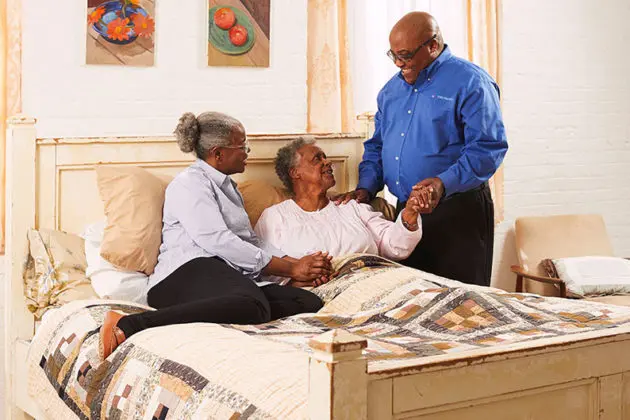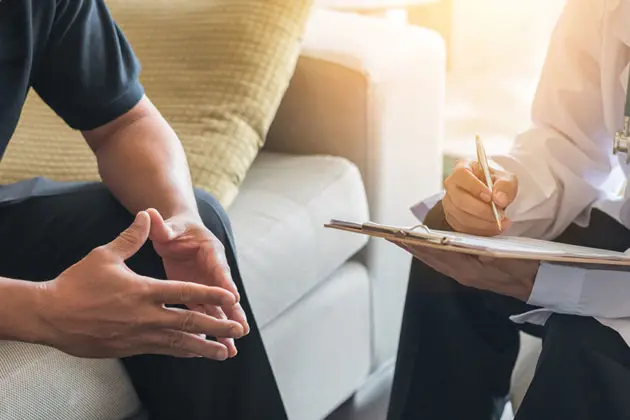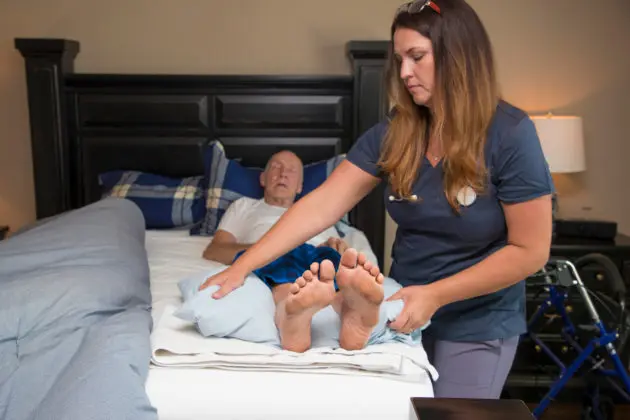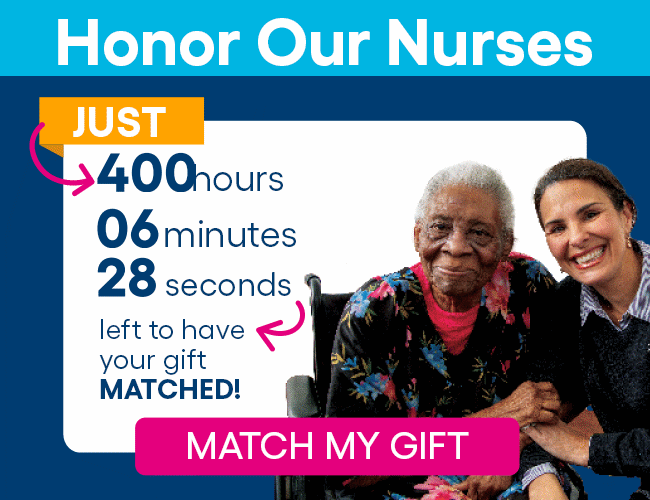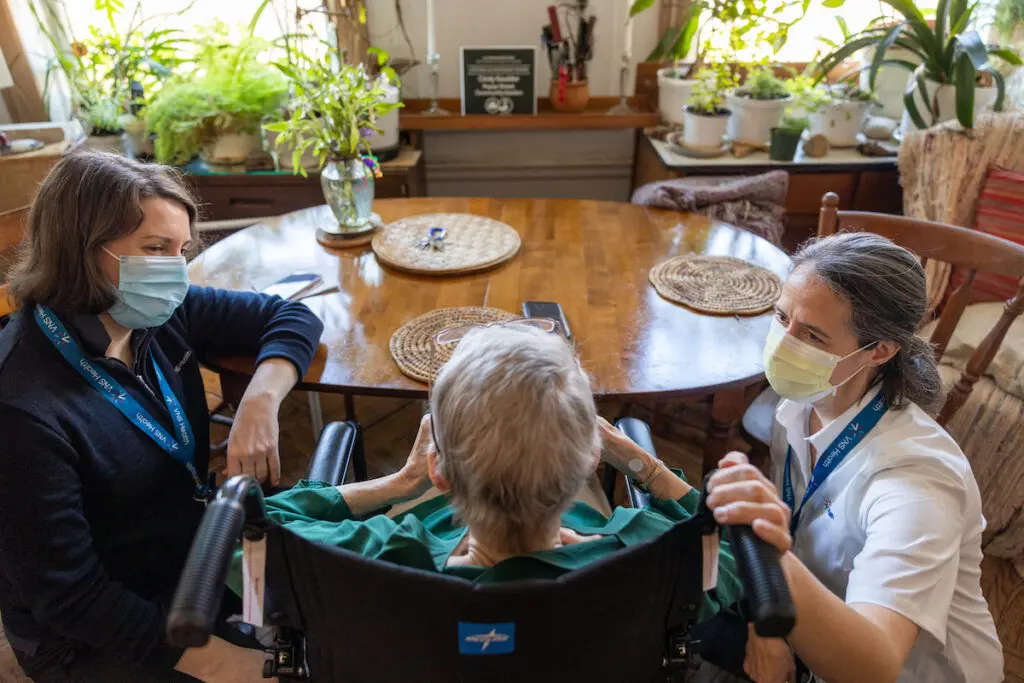
Caring for a very sick loved one is challenging — both physically and emotionally. With hospice care from VNS Health, you have compassionate experts you can rely. They will help you make your loved one’s last months as comfortable as can be, so they can enjoy the best quality of life possible.
Keep in mind that when you use hospice care, you (or another family member or close friend) will always be the primary caregiver. But your VNS Health hospice care team will support you, answer your questions, and give you the information you need to feel confident as you care for your loved one.
The members of your hospice care team will work with one another, and with you, to make end-of-life care as comfortable, easy, and stress-free as possible for you and your loved one.
Here are the types of people who may be on your loved one’s hospice care team.
Nurses
VNS Health hospice nurses are the main contacts on a hospice care team. Your nurse will:
- Check vital signs and manage pain or other symptoms
- Coordinate hospice services and manage other members of the care team
- Make sure you have the supplies and medicines your loved one needs
Your nurse will also ensure that you have the information you need to be prepared as your loved one’s health changes.
Nurses in our hospice program may be nurse practitioners, registered nurses, or licensed practical nurses.
Hospice care supports individuals at the end of life, as well as their families, by providing medical, emotional, and spiritual care. The goal is to help make the last months as comfortable and meaningful as possible.
Home Health Aides
Home health aides help with personal care (such as bathing, using the bathroom, and getting dressed), preparing meals, and feeding. They can remind your loved one when to take medicines, keep track of symptoms, and, in some cases, check vital signs.
Home health aides spend the most time with your loved one. An aide may be the first to notice a small change in your loved one that’s a sign of a bigger problem. When that happens, your aide will alert your hospice nurse so that your loved one gets attention right away.
Physicians
Hospice physicians act as consultants to your hospice care team. They attend hospice care team meetings, communicate with your loved one’s primary care provider, advise other members of the hospice team, and oversee medical care that is related to your loved one’s diagnosis. VNS Health hospice physicians are board certified in hospice and palliative medicine.
Social Workers
Social workers help your family cope with the present and prepare for the future. A hospice social worker can:
- Provide emotional support
- Guide decision-making
- Assist with practical matters, such as filling out insurance paperwork or writing advance directives
- Connect you with resources, such as Meals on Wheels
- Help you prepare for life after your loved one’s death
- Ensure that funeral arrangements are in place and provide support with funeral details after your loved one passes away
Spiritual Counselors
It’s natural for people who are at the end of their life to be anxious or afraid, to search for hope and meaning, and to question their faith and beliefs. It’s also natural for families to have these same feelings as they watch their loved one near the end of their life.
Regardless of your faith, religion, or heritage, spiritual counselors can help you and your loved one work through these emotions. They can work with clergy and can help you arrange rituals to honor your loved one’s spiritual beliefs or religious or cultural heritage.
Bereavement Support Counselors
After your loved one has passed away, VNS Health bereavement counselors are available to you and your family for 13 months to help you through the milestones of the first year, such as first holidays and the anniversary of your loved one’s death.
Grief support is available at any time during this 13-month period.
VNS Health offers grief support groups to connect you with others who have had similar experiences.
Volunteers
Volunteers can help in many different ways, such as:
- Providing companionship
- Calling your loved one when they first enter hospice
- Giving massages
- Bringing in animals for pet therapy
- Staying with your loved one during their final moments if you and your family are not available
Volunteers are there for you and your family too. They can take certain time-consuming and emotional tasks off your plate, like setting up a website to keep people updated or making bereavement calls after your loved one’s death.
Therapists and Specialists
In some cases, your hospice nurse may call in other experts to help your loved one.
Physical therapists help your loved one move around safely and teach them simple stretches to reduce stiffness. They can also show you how to move your loved one without hurting them or yourself.
Occupational therapists help your loved one use their fine motor skills (the tiny, precise movements we make with our hands to do everyday tasks) so they can still do things like brushing their teeth on their own.
Speech therapists work with your loved one to strengthen muscles in their face, mouth, and neck. This is important for hospice patients so they can chew and swallow safely and avoid choking.
Respiratory therapists set up equipment, recommend ways to help your loved one breathe more easily, and calm anxiety or panic that can set in when it’s difficult to breathe.
Wound care practitioners specialize in treating any wounds that come from your loved one’s disease or from being bedbound.
If your loved one is a veteran, they can also work with a veterans liaison in our Veterans Hospice Care program. Liaisons, who are veterans themselves and personally understand the effects of military service, are there to listen and provide information about veterans benefits. Liaisons can also work directly with the Department of Veterans Affairs if you wish.
